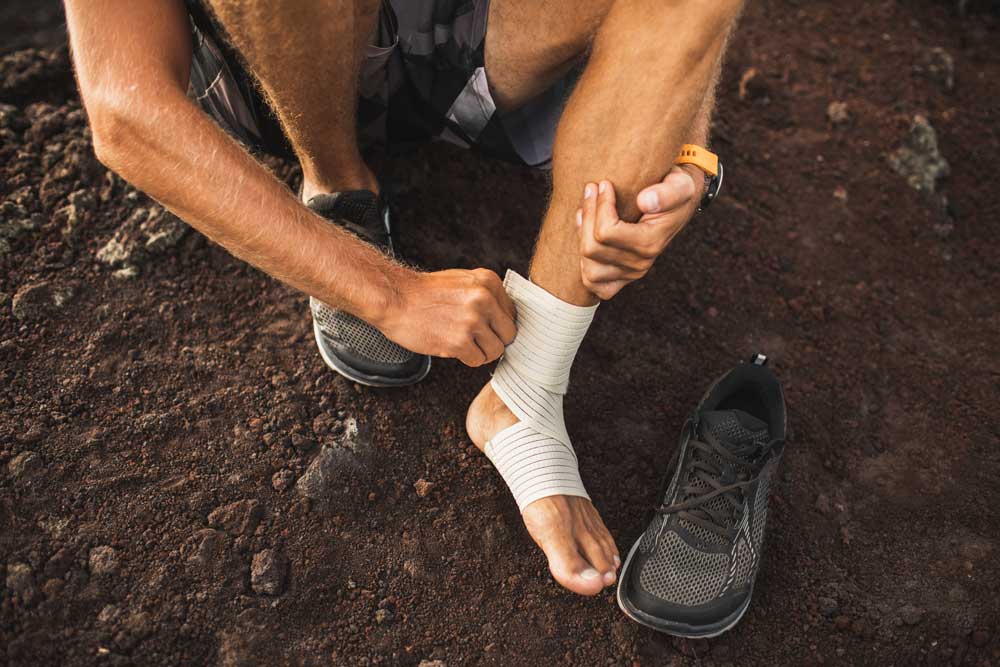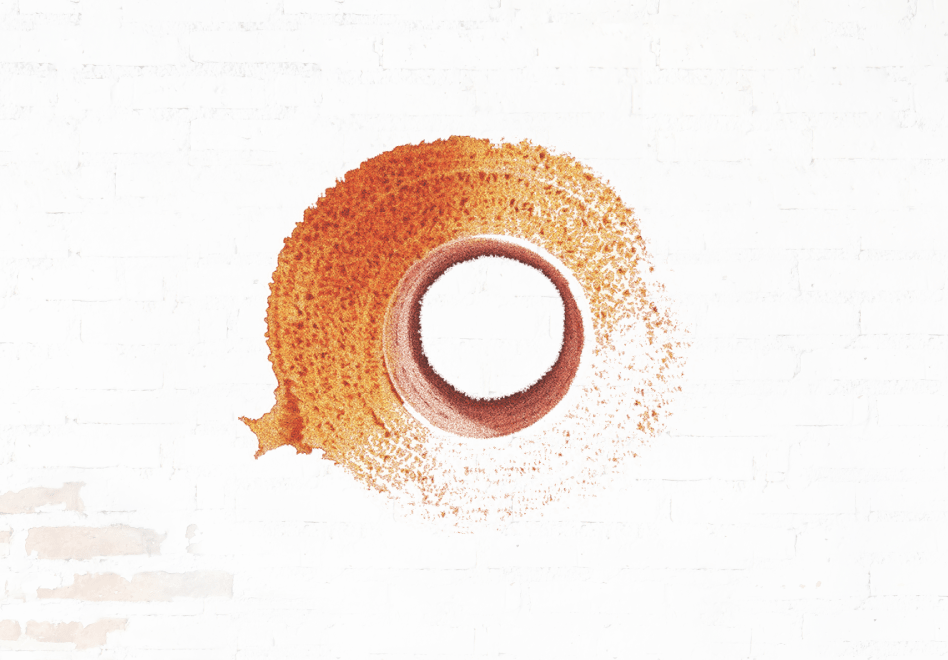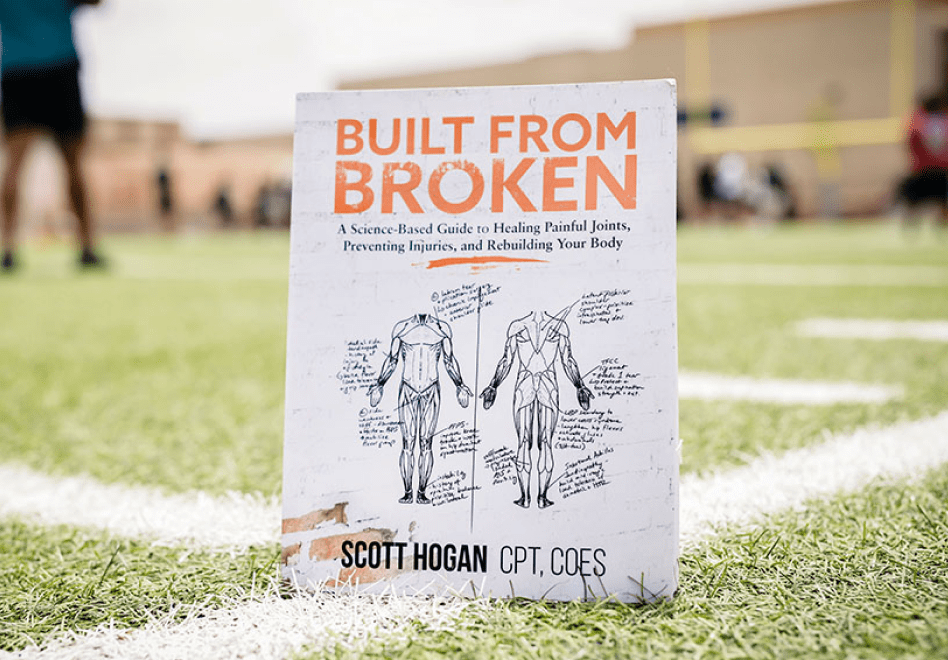
Be built (to last).
The right supplements can help you recover naturally and build a resilient body.

Supplement Quiz
Take this short quiz to discover the perfect supplements for your needs and goals.
About SaltWrap

Built from Broken
Get the best-selling book from SaltWrap founder, Scott Hogan, and start rebuilding today.
Collagen Supplementation for Joint Injury

By Alaina Curry, DPT
Have you ever injured your shoulder? Elbow? Hand? Knee? Ankle? Hip? Spine?
You’ve most likely experienced pain and discomfort in one or more joints at some point.
As an orthopedic physical therapist, I treat many athletes and active individuals daily. These people strive to go the extra mile to heal their injuries. The question they always ask is, “What can I do,” not “what can’t I do?”
That’s always the right attitude to start with.
But inevitably, when we sustain an injury, we tend to become functionally limited in one way or another. It could be as simple as not being able to open a jar of pickles due to joint pain in the hands. Or not being able to bend over to pick up your child because you hurt your back.
We rely on our healthy joints to live an active lifestyle. So, what can you do when you get injured?
In my experience, one of the simplest and most effective ways to help heal joint injuries is to take a collagen supplement.
Let me show you why.

Before We Begin
First and foremost, you should always involve a medical professional to establish a care plan. A licensed physical therapist can guide you through a unique rehab program. Manual therapy and corrective exercise can restore – and help improve – your quality of life after an injury.
(Side note: I’d love to help you come back stronger. See the link in my bio below for more info.)
As the physical therapist does their job to help you through your plan of care, keep that critical question in mind: “What CAN I do?”
While the answers will always be specific to you, virtually anyone can take a supplement for joint health. I believe that thoughtful supplementation can have significant benefits for our bodies.
And as far as supplements go, collagen is among the most versatile and beneficial.
Collagen Supplementation for Optimal Joint Health
Collagen supplementation has become something of a craze over the last decade. These supplements are everywhere, so it’s easy to be skeptical. You should be skeptical of any supplement making huge, hyped-up claims without backup.
But studies confirm that the benefits of collagen supplementation are more than just hype.
Research shows collagen can help improve skin elasticity and hydration, reduce joint pain, and improve overall joint function.1, 2
Speaking from personal experience, I use collagen regularly and find that I can bounce back quicker from injuries. (More on that in a moment.)
Many people wonder why taking a collagen supplement can help joints. Here’s a simple answer that doesn't require digging through piles of scientific research to find:
When you look at what makes up your joints, you’ll find that almost all of it is collagen.
Collagen and Tissue Healing
Our entire skeletal system is made up of collagen. Our bones, ligaments, tendons… collagen is an essential component of all of them. Fascia, which I like to describe as “the cobweb of body tissues,” is made primarily of collagen. Without it, our bodies would collapse into a pile of mush.3
That last example is a bit extreme, of course.
However, if we lack sufficient collagen—a common symptom of normal aging—our tissues cannot adapt to acute or chronic stress, which can lead to injury.
Even in cases where age may not be a significant factor, if the stresses on your body are past the tissue’s threshold, that tissue will become damaged. Cells will produce more collagen as part of the body’s natural healing process.
However, as we age or the injury becomes more extensive, this process can fall short.
It makes sense that supplementing with collagen could help enhance the body’s natural repair process. And multiple studies have confirmed this.
For instance, a 48-week placebo-controlled study at Tufts Medical Center confirmed through MRI scans that taking a specific form of bioactive collagen peptides helped increase connective tissue mass and cartilage growth in patients with knee pain.4
Another study found that collagen peptides help post-menopausal women experience increased bone formation and reduced bone degradation.5
So, there’s high-quality research to back up the efficacy of collagen supplementation.
That’s important. But it’s just part of the story. Experience is the other.
My Experience With Collagen Supplementation
As I mentioned, I believe in collagen supplementation. I supplement with collagen almost daily, and I tell my patients this. As you might expect, I’ve seen exceptional progress in injury recovery with some patients.
One example that comes to mind is a middle-aged man rehabbing Achilles tendonitis.
He was frustrated because he felt that his recovery was minimal and that the process was moving too slowly. That changed when he started adding collagen powder to his morning smoothies.
On a personal note, my mother had an L4-L5 discectomy more than 15 years ago. Her back pain returned just five years after the surgery. For more than a decade, despite physical therapy treatment, she continued to live with lower back pain.
Just over a year ago, she started taking collagen every morning. Today, she can confidently say that her back pain has finally subsided.
The big takeaway is that it’s never too late to add collagen to your regimen. Even if you’re dealing with the effects of an old or nagging injury.
But like anything else in life, there is some important nuance involved when it comes to using collagen supplementation in the rehab process.
For example, Scott has written about why you shouldn’t take collagen after surgery.
I agree – and I’ve seen it hurt progress in post-operative patients.
Specifically, a young athlete who was rehabbing an ACL reconstruction. She started supplementing with collagen immediately after her surgery. Unfortunately, this left her with too much scar tissue buildup. It required a knee scope for debridement later on.
However, it’s clear that even though there were adverse effects after a major surgery, supplementing with collagen significantly influenced the internal structures of her joints.
Putting It All Together
Whether you have pain from an injury or not, supporting your joints from the inside out will support a healthier you. Giving your joints the raw materials they need to function and feel their best is never a bad idea.
For most people, collagen supplementation is one of the most simple and powerful ways to support joint health.
Of course, you should be mindful if you’re in the acute stages of any injury or surgery. In that case, you should give your body at least 4-6 weeks of natural tissue healing time, depending on the severity of your situation.
Always consult your doctor under these circumstances.
As I mentioned, collagen supplementation is part of my toolkit for optimal joint health, whether or not I’m dealing with an injury. As a healthcare professional and fitness advocate, I always prioritize proper nutrition to fuel my active lifestyle.
My collagen of choice is SaltWrap’s Collagen Synthesis™.
I add it to smoothies, yogurt, and oatmeal. I’ll even take it by itself in water sometimes.
With Collagen Synthesis™, I know that I’m getting science-backed collagen peptides that are shown to help with injury and workout recovery. It gives my joints, muscles, and tendons the raw materials they need for optimal function and performance.
In other words, it covers all my bases.
You can see more about that in my recent episode of SaltWrap Stories below.

Alaina Curry, DPT, CSCS
Alaina Curry a founding member of SaltWrap's Clinical Advisory Board and one of South Florida’s most in-demand physical therapists.
A lifelong athlete and former NCAA All-American for Women’s Soccer, she became a Certified Strength and Conditioning Specialist to help athletes of all ages come back stronger – and unlock peak performance – after injuries.
Today, Alaina treats a diverse clientele who want to lead an active, pain-free lifestyle. If you’re interested in becoming a potential client, go here now to learn more.
-
Dutton, Mark. “Chapter 1: The Musculoskeletal System.” Dutton’s Orthopaedic Examination, Evaluation, and Intervention, 4th ed., McGraw Hill, New York, NY, 2016.
Founder: Scott Hogan

I created SaltWrap to bring together the most practical ideas in therapeutic sports nutrition, corrective exercise, and functional fitness — with the goal of keeping you (and myself) strong, mobile, and built to last.
I've worked as an A.C.E. Certified Personal Trainer, Orthopedic Exercise Specialist, and nutritional supplement formulator.
But more importantly — I've spent most of my life battling injuries, joint pain, and just being plain beat up. So I know what it's like to struggle toward fitness goals.
SaltWrap is here to push you through injuries, setbacks and perceived physical limitations. To a place beyond what you think you're capable of. Sign up here to stay in the loop.
Learn more about my best-selling injury prevention and recovery book, Built from Broken.






